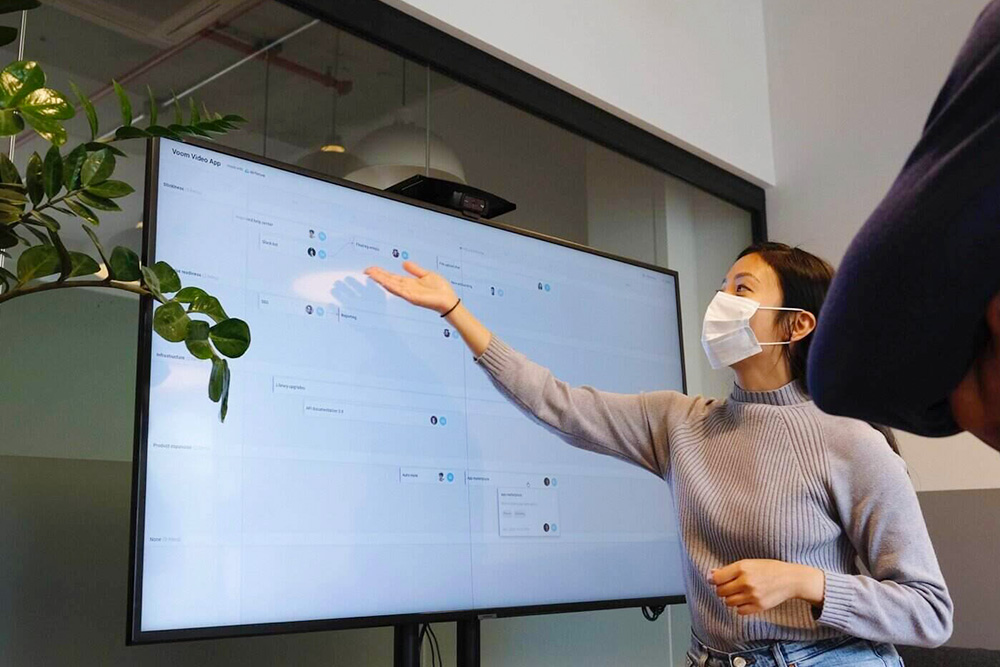Learn how tech companies are hiring top tech talent in Singapore
Download the Hiring Your Dream Tech Team in Singapore e-book to learn more
There are a number of reasons why Southeast Asia has earned its newfound reputation as the ‘next technology hub’ of the world. For one, the region has an incredibly young, tech-savvy population, with 26% under the age of 14 and some of the most engaged mobile internet users in the world. In fact, the internet economy in the region is now worth about US$100 billion according to estimates, tripling in value over four years.
The industry has even proven resilient against COVID-19. Between April and June 2020 when many Southeast Asian countries were under varying degrees of border restrictions and city- and nation-wide lockdowns, startups still saw US$2.7 billion worth of funding — a 91% year-on-year jump. The rise in funding has indirectly prompted an increase in hiring activities as well. Anthony Thompson, Executive Board Director & Regional Managing Director, Asia at PageGroup, observed that tech businesses have been especially proactive in terms of hiring in Southeast Asia.
“Financial services and insurance have been positive in Singapore, as the city-state continues to be an innovation hub for tech, digital and research and development.”
If you are a tech business with intentions of moving into the region, the conditions are certainly good and the opportunities are plenty — but where do you start? What roles must you hire first? Also, which market is the right one to start? Aarti Budhrani, Associate Director for Technology Contracting at Page Personnel, has some ideas to get you started.
Your first hires and what qualities to look out for
1. CEO and COO: Your Chief Executive Officer (CEO) and Chief Operations Officer (COO) go hand in hand as the first hires when setting up shop in a new market. The CEO is the big-picture person who controls the company’s general direction, vision and culture; the COO is concerned with the day-to-day operations that keep the business running. As for specific qualities to look out for, keep in mind that entering a new market requires a tremendous amount of local knowledge. As such, someone with regional and/or international experience is a must.
Speaking at a recent webinar on executive job search organized by Michael Page, Mabel Tang, Head of Talent Acquisition, Asia Pacific at Moët Hennessy, added that resilience, empathy and experience in organisational transformation are important too.
“As businesses evolve, they start to look for people who drive changes. So [candidates with] experience in business transformation or creating things from scratch, even if it’s a small project team, is [a real advantage].”
2. Project managers: Once you have the heads of the business locked in, it is time to bring in a Project Manager — or Project Managers, depending on the workload you anticipate. Adding this role to your first hires is critical because he or she is responsible for the project’s entire lifecycle, from the initial discovery of the problem to finding a potential solution with the product and/or service your business plans to offer. In terms of skill sets, project management tools (such as Jira and Microsoft Planner) and methodologies (Waterfall, Agile and Hybrid) are indispensable, especially for tech-related businesses. Furthermore, the best project managers are specialised within respective fields, so look out for candidates with experience working with disparate teams (remote, on-site and vendors), as well as proven track records in the tech industry.
3. Software Developers: The backbone of a technology-based business cannot ignore a capable team of web and software developers. “What we are seeing in many tech startups in Singapore is that they are actively hiring a lot of developers,” Budhrani shared. “This is particularly true if the business is within the technology domain.” With that said, Budhrani observed that, due to current circumstances, many startups opt for contractors or temp staff to fill these roles. Once the economy stabilises and the business grows bigger in the new market, Buhrani advised that it would be wise to shift some of these outsourced or contracting roles in-house instead.
4. Cloud DevOps Engineer: Budhrani also observed that, next to web and software developers, tech startups are also looking at DevOps Engineers. This person generally understands the software development lifecycle, has a solid grasp of different automation testing tools for continuous integration and delivery pipelines and can maintain vigilant security and monitoring along the way. What’s more, Budhrani shared that DevOps Engineers with cloud experience should be right up there on the hiring checklist, driven in part by the trend of operations moving increasingly into the cloud.
A closer look at tech talent in Indonesia, Australia and Singapore:
APAC’s tech scene is growing and evolving rapidly and as companies consider expanding to Asia, they need to decide which tech hub is best for their business. Here is a closer look at the talent pool, talent development policies and average salaries for Indonesia, Australia and Singapore. Salaries are based on research from Michael Page’s annual Salary Benchmark report:
|
Role |
Indonesia |
Australia |
Singapore |
|
C-Suite |
US$135,633 — US$271,326 |
US$177,348 — US$283,756 |
US$147,378 — US$589,511 |
|
Project Managers |
US$40,794 — US$61,191 |
US$85,126 — US$120,599 |
US$57,477 — US$110,528 |
|
Software Developers |
US$20,397 — US$33,960 |
US$49,658 — US$106,411 |
US$39,790 — US$88,422 |
|
Software Engineers |
US$16,301 — US$122,312 |
US$67,395 — US$106,413 |
US$36,843 — US$88,425 |
|
Expected salary increase when switching jobs |
15 — 50% |
5 — 10% |
12 — 15% |
Now that we know the average salaries for the 4 key hires in Indonesia, Australia and Singapore, let’s take a look at the tech talent recruitment situation in each country and what these tech hubs are doing to develop their talent pool.

Download the Hiring Your Dream Tech Team in Singapore e-book to learn more
Indonesia:
When looking at the talent pool in Indonesia, you will find a solid number of talent-ready tech professionals, especially in software, engineering, data and product management. According to Abednego Samudera, Manager, Technology, Michael Page Indonesia, there has been real growth in terms of talent in other areas of tech, driven by several factors. “From government investment in startup programs, continuous development on infrastructure and improvement on regulatory framework has driven many global tech players to open up their services in Indonesia. The launch of GCP, AWS, and Alibaba cloud is providing opportunities for local tech talents to upskill as companies look to adopt to new tech services.”
With this strong talent, there is still high demand for high quality candidates with the right set of skills. This is creating a talent war for top professionals, especially in data science, machine learning and emerging technology such as cloud, blockchain and cybersecurity. Key hires in tech for many companies in Indonesia include VP/ Department Head leadership roles and junior to mid-level engineering teams.
Australia:
Australia’s tech scene is growing fast and as a result, there is a major shortage of tech talent, particularly when it comes to software development, analysts, cloud computing and project managers. In a report released in 2019, Deloitte forecasted a shortage of 100,000 professionals in the tech sector by 2024. As an effect of COVID-19, this gap has narrowed as a large number of skilled professionals have come into the market, but this talent gap will widen again once businesses begin to recover.
Universities in Australia have already started to work on filling that gap, developing robust programs that ensure a focus on STEM education. The Australian government is also stepping up initiatives and programs to help upskill and reskill the local talent pool, with significant investment set aside in recent budgets to develop technology skills and knowledge.
Singapore:
The Singapore tech market and talent pool has a number of advantages that work in its favour and add value to any organisation opening or expanding operations here.
At the beginning of 2020, Singapore had around 3,800 technology startups, and more than 150 venture capital funds. Fintech remains the leading tech industry in Singapore, and the opening of digital banks is sure to increase that number. There is a focus on developing AI as well.
With a well-developed IT infrastructure, robust regulatory regime and vibrant innovation ecosystem, it’s clear that many tech companies are already seeing the advantages, allowing Singapore to settle comfortably into its status as a regional tech hub.
The Singapore government has been clear about investing in and prioritising tech in the upcoming years. The government has pledged to keep R&D spending at 1% of GDP, and has invested $19 billion into the Research Innovation and Enterprise (RIE) 2020 plan. Through government programmes and initiatives, budget has been set aside specifically to improve technology skill sets within the talent pool such as cybersecurity, data analytics and digital media. For example, Singapore plans to train more than 5,000 5G professionals over the next three years. These professionals will support companies’ efforts in developing and testing 5G applications across various sectors.

Singapore offers a wide variety of tech skills training programmes to employers and individuals. Source: Infocomm Media Development Authority (IMDA)
International investment also ensures constant development in Singapore talent. “Increasingly, Chinese companies are investing in tech talent in Singapore, giving professionals here exposure to new technologies that are extremely niche and globally in demand.” Shinjika Shukla, Associate Director for Technology Recruitment at Michael Page says.
Competition is high for these tech candidates, as 80 of the world’s top 100 tech companies are growing their business in Singapore, small and medium enterprises (SMEs) in Singapore are stepping up on digitalisation efforts and the Singapore government is also actively pursuing digital projects to improve public services. On this point, Shukla advises on how companies can attract talent: “The candidate is interviewing the employer now as well, so employers need to be prepared to explain to candidates what long term growth and technology exposure they will have for them. Companies looking to attract tech talent should be able to share a plan for technology spend and what their technology landscape looks like now and in the future.”
As a regional hub, Singapore’s tech talent pool boasts a large number of individuals with the technical skill sets to aid businesses in recovery for the present and growth into the future.
This article is part of a content collaboration between the Singapore Economic Development Board and Michael Page Singapore. Michael Page is a leading recruitment agency with 140 offices in 36 countries. For more than 40 years, Michael Page has been providing targeted, high-quality recruitment services for mid- and senior-level professionals across different functions and industries — including the technology sector. To find out more on Michael Page’s technology-related specialties, visit their site here.